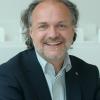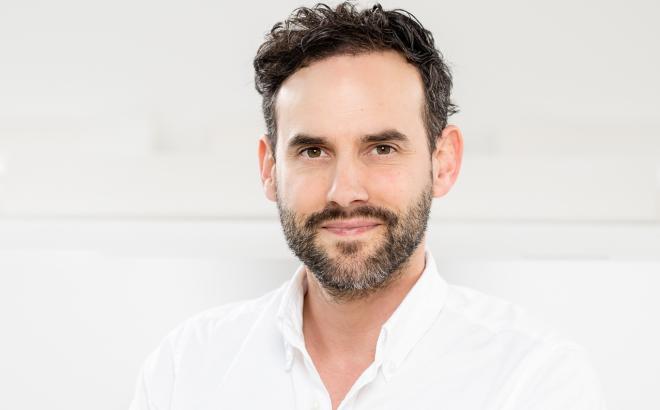Andreas Farnleitner, Microbiologist & Toxicologist
Water - Elixir of Life and Source of Health
What do a speleologist, a musician and a microbiologist have in common?
Very much for Andreas Farnleitner – all three subjects are the passion he pursues. As teenager, he was enthusiastic about climbing through ice caves. A few years later, he followed his desire and tried his hand as musician and composer. It was by chance, as he puts it, that he discovered yet another profession: “Telling me about his technical education at a Secondary College of Electrical Engineering (HTL), a school friend got me to study biology at the University of Vienna. The main subjects of microbiology and ecology fascinated me right away, just like the field of water which attracted me magically.” It was, however, soon clear for him that he wanted to specialise and deal with up-to-date, application-oriented questions of life in the broad landscape of biology. “I made my wish come true by enrolling for Ph.D. studies at the Vienna University of Technology (TU Wien), where I could combine microbiology and molecular biology with technical aspects and engage in research at the same time.” In the following years, Farnleitner and his team was able to combine basic research activities with prevailing issues of water management in a number of national and international projects, through fundings by FWF, Austria's central funding organisation for basic research, and in an excellence scholarship granted by the Academy of Sciences. “Back then, I already worked closely with the Vienna Water municipal department, but also with other public and private clients.” For his dissertation, he investigated molecular diagnostics and microbiological water quality.
He wanted to better understand the correlation between medical and hygienic basics and their effects on human beings and the environment. This was the reason why he started postgraduate studies of toxicology at the Medical University of Vienna to explore aspects of prevention, health and environment on a professional level. “Joining the Water Quality and Health Division as postdoc was the logical consequence of my education, i.e. the hybrid of aspects from engineering, natural sciences and health sciences”, Farnleitner explains.
Establishing the Interuniversity Cooperation Centre for Water and Health (ICC Water & Health) with colleagues from the Vienna University of Technology and the Medical University of Vienna led him to the Karl Landsteiner Private University of Health Sciences. “When developing the KL profile as a young university of health sciences, it turned out soon that the Water Quality and Health Division as USP would also fit very well into the courses here in Krems. A few years later, I applied for the corresponding professorship and in 2017, I was appointed head of the Water Quality and Health Division here at the Department of Pharmacology, Physiology and Microbiology.” This professorship is part of the ICC Water & Health Research Triangle (KL-TU-MedUni) with international visibility and a “critical mass”. In this context, Farnleitner is also professor at the Department of Microbiology and Molecular Diagnostics at the Vienna University of Technology.
For the expert, it is essential that a university dealing with health sciences investigates the correlations between environment and health in order to derive preventive measures to protect health. “I think this is particularly vital for student doctors. Medicine is often reduced to traditional aspects such as curative care, drug development and the like. However, prevention plays such an important role. The division uses the discipline of environmental health and takes water quality and human health (water hygiene) to set an example that is visible on a national and international scale. And this inspires ours, too.” To achieve this, two basic expert fields are integrated at the KL Private University: central aspects of environmental hygiene and microbiology together with molecular diagnostics. “In cooperation with the clinical Institute of Hygiene and Microbiology of the University Hospital of St. Pölten, we established for example the new course module “Microbiology and Hygiene” for the Bachelor's studies of “Medical Sciences” together with medical specialists making it state-of-the-art and fit for the future. We show that hygiene is an essential subdiscipline in medicine and health sciences.”
Water is one of the key environmental subjects of the World Health Organisation WHO and also one the 17 UN goals of sustainable development. In addition to regular consultant activities for the WHO, many other national and international bodies ask for Professor Farnleitner’s support as leading expert. “We have to deal with the continuous changes of our environment and their consequences everywhere in the world. Water and water quality as well as hygiene are central factors. Changes in the environment call for new aspects to be taken into account. We can, for example, derive management goals such as how much wastewater and drinking water treatment we will need in future to guarantee sufficient infection protection and safe drinking water.” In addition to ongoing research projects of the division, Farnleitner and his colleagues carry out the research cooperation “Vienna Water Resource Systems 2021+” of the City of Vienna and the ICC Water Health, which will last until 2029 offering a number of doctoral jobs. The programme deals with the global changes from scientific and application-oriented perspectives trying to consider health, ecological and technical aspects, the expert explains. “Urbanisation, population growth and globalisation can accelerate the spreading of new infection diseases, a topic that has become more present, not only through Covid-19. On the other hand, the climate change naturally shows its consequences, such as water shortage, droughts and severe weather. Doing research in these fields therefore is of sustainable significance.”
The happily married father of three children and grandfather of two grandchildren likes to relax in the family and in nature. As a certified mountain and ski guide, his time in the mountains would also be unthinkable without his passion for the environment and water.
Link to the KL research information system KRIS





